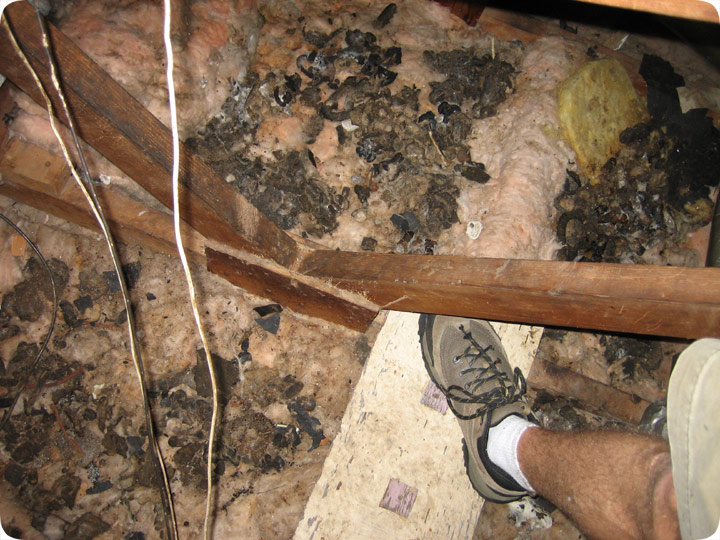
This is a photograph of raccoon fecal contamination inside an attic. Do not touch raccoon feces. It can
contain raccoon roundworm, which can infect people, and cause blindness and other terrible symptoms. Call your phone number
and you will get free advice about how to handle and clean raccoon droppings.
First off, the contraction of diseases from raccoons, either by people or pets, is very rare. Common sense is the best prevention. Don't approach or attempt to handle a raccoon that looks
sick (or healthy, for that matter). Don't pick up raccoon poop and then eat lunch without washing your hands.
Rabies is the most commonly cited disease associated with raccoons. Never approach a raccoon that looks
sick, confused, or that is moving awkwardly. Rabid raccoons may be either lethargic or walking erratically, perhaps in circles. It's also common for
the hind legs to become paralyzed in the later stages, or paralytic stages. A raccoon might also exhibit aggression or foaming at the mouth
during the excitative stage. Raccoons don't go about carrying rabies all the time and transmitting them to everyone, as many people seem to
think. They can only pass on rabies during the last week of life, when actual symptoms are present.
Canine Distemper is an even more common raccoon disease, it's fatal to raccoons, and some symptoms are very similar to rabies. Pets, such as dogs,
are very vulnerable to this disease, so be careful to prevent a Fido-Rocky encounter. The early stages of distemper mimic rabies, and it's important that
domestic dogs and cats have full vaccinations and are checked for worms once a year, even if there's no raccoon presence nearby.
As stated above, the droppings of raccoons can contain raccoon roundworm (Baylisascaris procyonis & B.
columnaris). This parasitic worm can and does infect humans. The egg spores in the raccoon droppings are light and can become airborne, and people can
breathe them in and become infected. Infection of humans can lead to larval parasite migration to the central nervous system. These egg spores can live
for years as dry pods. This is a very dangerous to humans, especially children, and a much more important and realistic threat than rabies. Someone once
asked me about Albenzadole for treating raccoon roundworm, but I've never heard of it.
Raccoons also carry Giardia lamblia, a protozoan causing diarrhea associated with ingesting food or water contaminated by raccoon
excrement. Trypanosoma cruzi is associated with raccoon excrement as are Rickettsia rickettsii, Leptospirosis, and Salmonella. They are also host to
a number of parasites, such as lice and fleas. Oftentimes people with raccoons in the attic will notice that their pets (and in a few cases themselves)
suddenly have fleas that they never had before. I often get fleas on me when I enter attics that hold raccoons.
If you want to enlist the help of a professional, I believe that most of the wildlife control operators listed on this wildlife removal directory,
which includes listings for 450 US cities and towns, do a competent job. I've also compiled a list of good raccoon experts in several major US cities, including
Charlotte -
Fort Lauderdale -
Miami -
Seattle -
Portland -
Oakland -
Los Angeles -
San Diego -
Phoenix -
Dallas -
Houston -
Denver -
Cincinnati -
Baltimore -
Nassau County -
Jacksonville -
Orlando -
Tampa -
Boca Raton -
Westchester -
Chicago.
But before you hire anyone, be sure to read this guide and gain a good understanding of the matter at hand, and ask whoever you wish to hire the right questions, and be sure that they remove the baby raccoons as part of their wildlife control solution!
The above diseases should also help deter anyone who is interested in a pet raccoon, because of the health hazards involved.